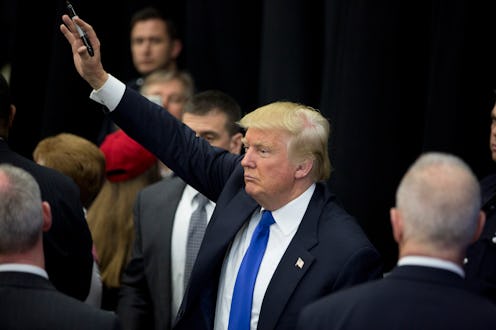News
Donald Trump Killed It On Super Tuesday
With all the polls closed and caucuses finished in the 13 states and one territory (hello, American Samoa!) that voted on March 1, it is clear that Donald Trump is the Republican Super Tuesday winner. With 661 delegates at stake from Alaska to Vermont, all eyes were on the nearly-consistent Republican frontrunner to see if he could lock up with the nomination. While it's not looking like Trump can cruise to the Republican National Convention in July just yet, he certainly solidified his status as leader and provided ample evidence he could win the party's nomination — even if the GOP establishment was uniting against his candidacy.
The race for the Republican presidential nomination has hardly been a paragon of class and reverence, but things turned especially ugly in the days leading up to Super Tuesday. On Sunday, Trump failed to denounce former Ku Klux Klan leader David Duke. Although Trump blamed the incident on a "bad earpiece," it raised obvious concerns about his unwillingness to properly distance himself from a white supremacist.
And although Trump has not only led the GOP presidential candidates in delegates but boorish insults, his colleagues gave him a run for his money. Florida Sen. Marco Rubio fully joined the mudslinging this week; the seemingly clean-cut Floridian senator implied Trump had a small penis as he addressed a full crowd in Virginia on Sunday.
But the strategy did not appear to be successful for Rubio — at the time of publication, Rubio had only won one Super Tuesday state, Minnesota. It was also his first victory of the entire nomination cycle.
Cruz, perhaps, was too busy attempting to keep the Donald from stealing the Lone Star State from him to get quite as caught up in the verbal spats — or too busy encouraging his colleagues to drop out. After voting for himself on Tuesday, Cruz told reporters, "For any candidate that wakes up tomorrow morning who has not won any states, for any candidate who wakes up tomorrow morning and has a negligible number of delegates, I think it's time to start thinking about coming together and unifying and presenting a clear choice." Cruz did manage to pick up Texas, as well as Oklahoma. The two victories added momentum to his campaign and evidence to his claim that he is the Republican who can beat Trump.
However, Cruz may not want to bank on other Republicans quitting the race. Ohio Gov. John Kasich has publicly vowed to keep fighting for the nomination until his home state votes on March 15. Based on his performance at the polls thus far, the candidate most likely to quit the Republican race is Ben Carson, but he seems to have no intention of dropping out yet.
The next states up for the Republican candidates are Kansas, Kentucky, Louisiana, and Maine, which hold their votes on Saturday, March 5.
